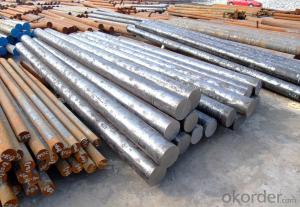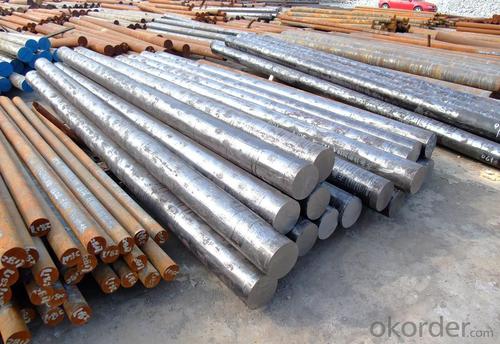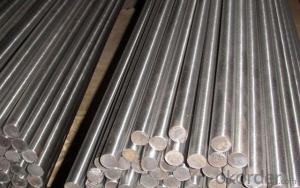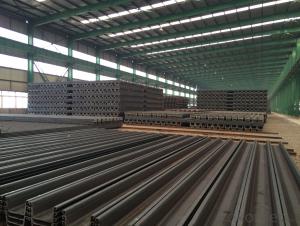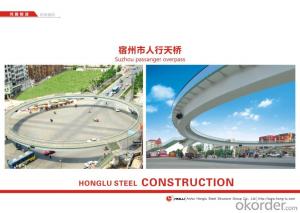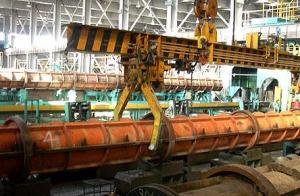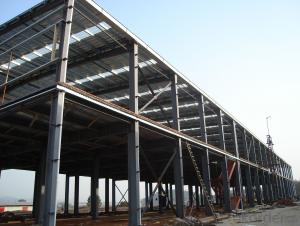Light steel rail made in China for construction
- Loading Port:
- Tianjin
- Payment Terms:
- TT or LC
- Min Order Qty:
- 10000 m.t.
- Supply Capability:
- 10000 m.t./month
OKorder Service Pledge
OKorder Financial Service
You Might Also Like
Product Description:
OKorder is offering Light steel rail made in China for construction at great prices with worldwide shipping. Our supplier is a world-class manufacturer of steel, with our products utilized the world over. OKorder annually supplies products to European, North American and Asian markets. We provide quotations within 24 hours of receiving an inquiry and guarantee competitive prices.
Product Applications:
Light steel rail made in China for construction are ideal for structural applications and are widely used in the construction of buildings and bridges, and the manufacturing, petrochemical, and transportation industries.
Product Advantages:
OKorder's Light steel rail made in China for construction are durable, strong, and resist corrosion.
Main Product Features:
· Premium quality
· Prompt delivery & seaworthy packing (30 days after receiving deposit)
· Corrosion resistance
· Can be recycled and reused
· Mill test certification
· Professional Service
· Competitive pricing
Product Specifications:
Grade | AISI 52100, ASTM E52100, DIN 1.3505,JIS SUJ2, GCr15 |
Dimensions | Diameter: 30-60mm Length: 2000-13000mm or as required |
Shape | Round Bar |
Type | Alloy Steel Bar |
Delivery Condition | Black Surface |
Material | Bearing Steel |
Technique | Hot Rolled |
Usage and Applications of Bearing Steel Round Bar
Bearing steels are used for ball and roller bearing applications and are comprised of low carbon steels and high carbon through harden able steel.
First the famous 1C-1.5Cr steel from which the majority of bearings are made. Its structure is apparently well-understood and the focus is on purity in order to avoid inclusions which initiate fatigue during rolling contact. Then there is the M50 steel and its variants, from which bearings which serve at slightly higher temperatures in aeroengines are manufactured, based on secondary-hardened martensite.
Tapered roller bearing are generally used to support combined load mainly consisting of radial load. Their cups are separable for easy assembling ,During mounting and using, radial clearance and axial clearance can be adjusted and preloaded mounting can be made.
Packaging & Delivery of Bearing Steel Round Bar
Packaging Detail: ASTM 52100 Steel in seaworthy packing or on customer request; Packed in bundles with standard export sea-worthy package or as customer require
Delivery Detail: 45 days after confirmed
Trade terms: FOB, CFR, CIF ou as customer's required
MOQ: 25 tons or at customer's demands. If the quantity is good, the price will be better.
Processing of Bearing Steel Round Bar
The processing of Bearing Steel Round Bar is hot rolled (strictly control sulphur, phosphorus and non-metallic inclusions content and distribution)
Chemical Composition of Bearing Steel Round Bar
C | Si | Mn | Cr | Ni | Cu |
Equal or less than | |||||
0.95-1.05 | 0.15-0.35 | 0.25-0.45 | Cr:1.40-1.65 | 0.30 | 0.25 |
All products' chemical composition and specification can be design according to customers' requirement.
Note of Bearing Steel Round Bar
1. According to national standard (GB) for our products, if not, supply according to national standards (GB) or agreement.
2. We can not only provide electric furnace +LF+VD and electros lag re-melting (ESR) steel forging materials, but also forging products of piece, bar, etc.
3. Our company is equipped with roll equipment and can provide our customers with roll billets or finished.
4. Please send us your detailed specifications when inquire. We will reply to you ASAP.
5. Certificate of quality is issued in English, in addition the normal terms, production process, the mechanical property (yield strength, tensile strength, elongation and hardness. forged ratio, UT test result, Grain size, heat treatment methods and the sample of is shown on the certificate
FAQ:
Q1: How do we guarantee the quality of our products?
A1: We have established an advanced quality management system which conducts strict quality tests at every step, from raw materials to the final product. At the same time, we provide extensive follow-up service assurances as required.
Q2: Can stainless steel rust?
A2: Stainless does not "rust" as you think of regular steel rusting with a red oxide on the surface that flakes off. If you see red rust it is probably due to some iron particles that have contaminated the surface of the stainless steel and it is these iron particles that are rusting. Look at the source of the rusting and see if you can remove it from the surface.
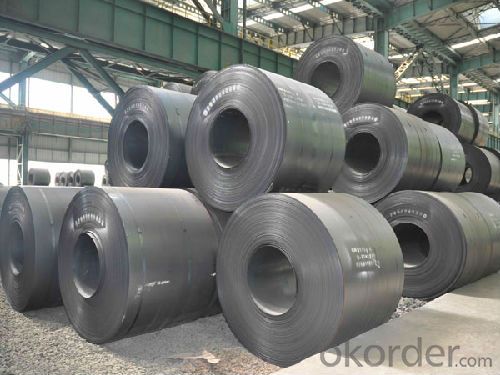
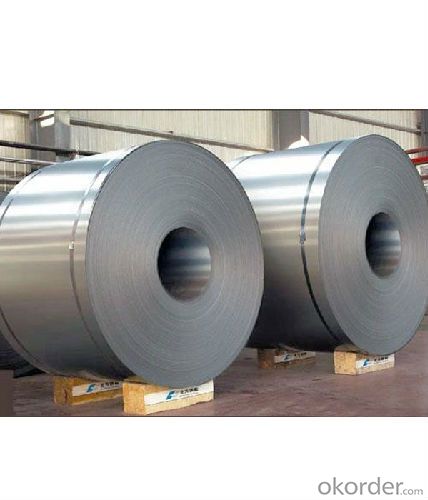
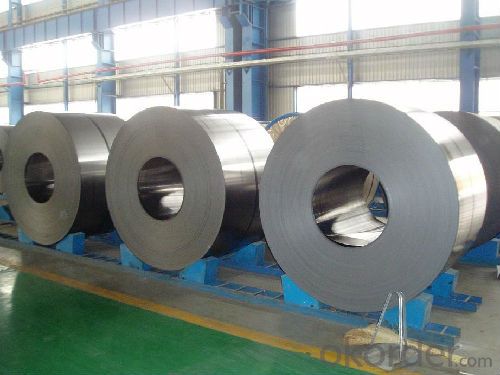
- Q: What are the main characteristics of high-speed steel?
- High-speed steel (HSS) is a type of tool steel that is widely used in machining applications due to its exceptional properties. The main characteristics of high-speed steel include: 1. Superior Hardness: HSS is known for its remarkable hardness, which allows it to withstand high temperatures and resist wear. This hardness is achieved through the addition of various alloying elements like tungsten, molybdenum, cobalt, vanadium, and chromium. 2. Excellent Heat Resistance: High-speed steel has exceptional heat resistance, enabling it to maintain its hardness and strength even at elevated temperatures. This property is crucial in applications where the tool needs to withstand high cutting speeds and generate significant amounts of heat. 3. Good Toughness: HSS possesses good toughness, which means it can resist cracking and chipping under heavy loads or impact. This characteristic ensures that the tool can endure demanding cutting conditions without premature failure. 4. High Wear Resistance: HSS exhibits high wear resistance, making it suitable for cutting, drilling, and milling operations. It can withstand prolonged usage without losing its sharpness or performance, resulting in extended tool life. 5. Versatility: High-speed steel is highly versatile and can be used for a wide range of applications, including cutting, shaping, and forming various materials such as metals, plastics, and wood. Its versatility makes it a popular choice in industries like manufacturing, automotive, aerospace, and construction. 6. Ease of Machining: HSS can be easily machined and shaped into different tool designs, which allows for customization and optimization based on specific applications. This characteristic makes it a preferred material for manufacturing cutting tools like drills, end mills, taps, and saw blades. 7. Cost-Effective: Compared to other high-performance tool materials like carbide, high-speed steel is relatively more cost-effective. It provides a balance between performance and affordability, making it a cost-efficient choice for many machining applications. In conclusion, high-speed steel is valued for its exceptional hardness, heat resistance, toughness, wear resistance, versatility, ease of machining, and cost-effectiveness. These characteristics make it a preferred material for a wide range of cutting tools, ensuring efficient and reliable machining operations.
- Q: What are the different pharmaceutical grades of special steel?
- There are various pharmaceutical grades of special steel that are specifically designed and produced to meet the stringent requirements of the pharmaceutical industry. These grades are used in the manufacturing of equipment, instruments, and components that come into direct contact with pharmaceutical products. The different pharmaceutical grades of special steel include: 1. 316L Stainless Steel: This grade is widely used in pharmaceutical applications due to its excellent corrosion resistance and high purity. It is often referred to as surgical stainless steel and is suitable for parts that require frequent cleaning and sterilization. 2. 304 Stainless Steel: This grade is also commonly used in the pharmaceutical industry for its corrosion resistance and ease of fabrication. It is suitable for equipment and components that do not require as frequent cleaning or sterilization. 3. Duplex Stainless Steel: This grade offers a combination of high strength and corrosion resistance, making it suitable for applications where durability and reliability are key. It is often used in pharmaceutical processing equipment that handles aggressive chemicals or high-pressure environments. 4. Hastelloy: This is a nickel-based alloy that exhibits superior resistance to corrosion, heat, and chemicals. It is commonly used in pharmaceutical applications where extreme conditions are present, such as in reactors or vessels that handle highly corrosive substances. 5. Titanium: Although not technically steel, titanium is often considered a pharmaceutical-grade material due to its excellent biocompatibility and corrosion resistance. It is used in medical implants and devices, as well as in pharmaceutical equipment that comes into contact with sensitive drugs. These pharmaceutical grades of special steel are carefully selected based on their specific properties and suitability for pharmaceutical applications. They are manufactured and tested to ensure compliance with industry standards and regulations, such as Good Manufacturing Practices (GMP) and the United States Pharmacopeia (USP). Using the appropriate grade of steel in pharmaceutical manufacturing helps to ensure product safety, quality, and integrity.
- Q: What are the benefits of using special steel in the energy sector?
- The benefits of using special steel in the energy sector are numerous. Firstly, special steel offers exceptional strength, durability, and resistance to corrosion, making it ideal for withstanding the harsh conditions experienced in energy production and transmission. This allows for longer service life and reduced maintenance costs. Additionally, special steel possesses excellent heat resistance, enabling it to withstand high temperatures and pressure, making it suitable for use in power generation equipment such as turbines and boilers. Furthermore, special steel is highly versatile and can be customized to meet specific requirements, facilitating the design and construction of complex structures and components in the energy sector. Ultimately, the use of special steel enhances the reliability and efficiency of energy systems, contributing to overall sustainability and cost-effectiveness.
- Q: What are the different joining methods used for special steel?
- The different joining methods used for special steel include welding, soldering, brazing, and mechanical fastening. Welding involves melting the base metal and adding a filler material to create a strong bond. Soldering and brazing use lower temperatures to join the steel using a filler material with a lower melting point. Mechanical fastening methods include bolts, nuts, screws, and rivets, which provide a secure connection without altering the base metal's properties.
- Q: What are the limitations of using special steel in high-stress applications?
- There are several limitations to using special steel in high-stress applications. Firstly, special steel can be expensive compared to other materials, making it less economical for certain projects. Additionally, special steel may not possess the necessary resistance to corrosion or other environmental factors, which can limit its durability in certain conditions. Moreover, special steel may have specific temperature limitations, as it can lose strength at extreme heat or cold. Finally, the availability of certain special steel grades may be limited, making it challenging to source the required material for high-stress applications.
- Q: How does special steel perform in high-temperature oxidation?
- Special steel performs well in high-temperature oxidation due to its enhanced resistance to heat and corrosion. It exhibits superior strength and stability, retaining its mechanical properties even at elevated temperatures. Additionally, the presence of alloying elements like chromium, nickel, and molybdenum in special steel forms a protective oxide layer that prevents further oxidation. This makes special steel an ideal choice for applications requiring resistance to high-temperature oxidation, such as in aerospace, power generation, and chemical industries.
- Q: How does special steel perform in terms of fatigue strength?
- Special steel generally performs well in terms of fatigue strength. It is specifically designed to withstand repeated loading and unloading without experiencing fatigue failure. Its unique composition and heat treatment processes make it highly resistant to crack initiation and propagation, resulting in an extended fatigue life compared to regular steel. Additionally, special steels often exhibit improved resistance to other forms of degradation, such as corrosion, which further enhances their overall fatigue performance.
- Q: What are the applications of special steel in the aerospace industry?
- Special steel has various applications in the aerospace industry due to its exceptional properties. It is commonly used in aircraft engines, landing gears, and structural components. Special steel's high strength-to-weight ratio, corrosion resistance, and ability to withstand high temperatures make it suitable for critical parts that require durability, reliability, and performance in extreme conditions. Additionally, its excellent fatigue resistance and ability to be heat-treated allow for the production of lightweight yet robust components, contributing to fuel efficiency and overall aircraft performance.
- Q: How does special steel contribute to product innovation?
- Product innovation is greatly influenced by the use of special steel, which offers various advantages. Firstly, special steel provides superior mechanical properties, including high strength, hardness, and wear resistance. These qualities permit designers and engineers to develop innovative products that can endure higher levels of stress, function in extreme conditions, and have extended lifespans. An excellent illustration of this is the aerospace industry, where special steel is frequently employed to manufacture lightweight yet robust components that enhance fuel efficiency and overall aircraft performance. Furthermore, special steel can be customized to possess specific attributes such as corrosion resistance, heat resistance, or magnetic properties. This enables the creation of groundbreaking products capable of operating in demanding environments like marine structures, power plants, or electronic devices. For instance, in the medical field, special stainless steel alloys are extensively used to produce implants and surgical instruments that are biocompatible, long-lasting, and resilient to rigorous sterilization processes. Additionally, special steel can be fabricated with precise dimensions and tolerances, facilitating intricate and complex designs. This fosters product innovation by allowing the production of intricate components such as gears, bearings, or turbine blades, which necessitate high precision and reliability. These advanced designs have the potential to enhance the efficiency, performance, and overall functionality of various products, ranging from automotive engines to wind turbines. Moreover, the versatility of special steel permits its combination with other materials, such as polymers or composites, to create hybrid products with unique properties. This opens up avenues for innovation in various industries, including automotive, construction, and consumer electronics. For example, special steel-reinforced concrete structures exhibit increased robustness and durability, while special steel-reinforced polymers enhance the strength and impact resistance of lightweight components. In conclusion, special steel contributes significantly to product innovation by offering enhanced mechanical properties, tailored characteristics, precise dimensions, and compatibility with other materials. These capabilities empower designers and engineers to develop innovative products with improved performance, durability, and functionality, thereby driving advancements across diverse industries.
- Q: How is high-strength steel used in the automotive industry?
- High-strength steel is extensively used in the automotive industry for various applications. It is commonly used for manufacturing car frames, body panels, and structural components due to its exceptional strength, durability, and lightweight properties. This type of steel enhances the overall safety and performance of vehicles while reducing their weight, thereby improving fuel efficiency and reducing emissions. High-strength steel also provides enhanced protection in case of accidents by effectively absorbing and distributing energy during collisions.
Send your message to us
Light steel rail made in China for construction
- Loading Port:
- Tianjin
- Payment Terms:
- TT or LC
- Min Order Qty:
- 10000 m.t.
- Supply Capability:
- 10000 m.t./month
OKorder Service Pledge
OKorder Financial Service
Similar products
Hot products
Hot Searches
Related keywords
